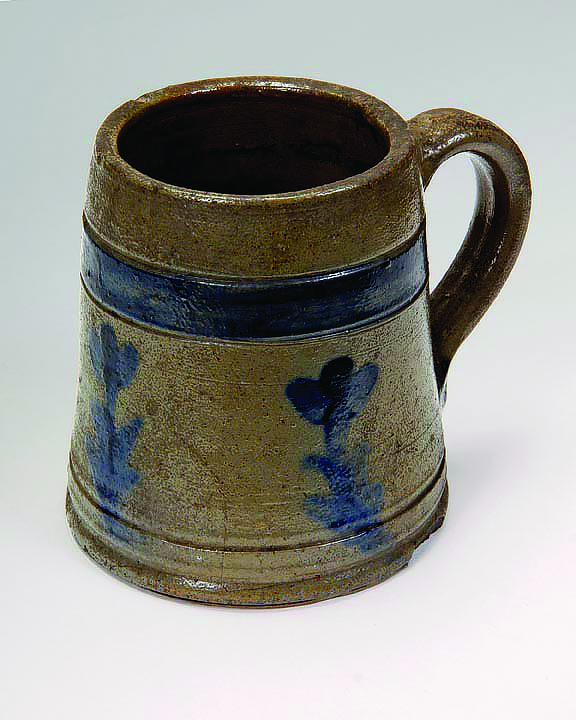

Mug (4 ¼"H), stoneware with cobalt decoration in decorative tulips, a common motif of Decker pottery. (Backcountry Makers, Figure 70)
During the second half of the 19th century, the rivers throughout Northeast Tennessee and Southwest Virginia — and the good clay that lined them — spawned a thriving ceramics industry. One person who took advantage of this was Charles Frederick Decker. Born in 1832 in Germany, Decker arrived in America as a teenager and worked in a Philadelphia pottery factory making stoneware. By 1857, he had started his own pottery operation, which he called Keystone Pottery.
Over the next 10 years, Decker married and started a family, which included four sons, William, Charles Jr., Fred and Richard. Something compelled him to move west, and around 1870, he and his family were living in Washington County, Virginia. At age 38, Decker established another pottery business on a farm outside Abingdon, but it wasn’t long before he was on the move again.
This time it was just across the state line to Washington County, Tennessee, which would be his final home after many years of moving around. There in the Chuckey Valley, Decker established yet another stoneware operation, once again calling it Keystone Pottery. During the coming years, he reached his peak as a skilled potter, with his sons joining him in the family trade. Some of their stoneware was decorated with blue cobalt, and they made everything from jugs and crocks, to kegs and mugs and even dog bowls, flower pots and grave markers.
Decker’s long-running family pottery business was one of the few that lasted into the 20th century when other forms of containers gradually took the place of ceramics. Charles Decker appears in the 1910 population census, a widower, age 78. He died in Washington County, Tennessee, in 1914.
This is the second in a new series of articles on Tennessee arts and antiques by Betsy K. White, director of William King Museum of Art, Abingdon, Virginia. She is the author of two books on the history of the region’s decorative arts and material culture: “Great Road Style: The Decorative Arts Legacy of Southwest Virginia & Northeast Tennessee” and “Backcountry Makers: An Artisan History of Southwest Virginia and Northeast Tennessee.”